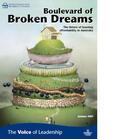Mayors and urban planners have crucial roles in the management of cities. They must help cities adapt rapidly when confronted with external shocks—the pandemic is only the latest one of these. To be a prudent and efficient janitor is the main task of mayors. read more »
Planning
How Cato Sold Out California Property Owners
In September, 2021, California Governor Gavin Newsom signed a bill abolishing single-family zoning. This bill was a victory for the Yes in Other People’s Back Yards (YIOPBY) movement, as well as for urban planners who sought to densify California urban areas, which are already the densest in the nation. read more »
- Login to post comments
A Long Term Outlook on Housing Affordability
So, there’s yet another inquiry into housing affordability underway. This latest is called “The House of Representatives Standing Committee on Tax and Revenue inquiry into housing affordability and supply in Australia.” Chaired by NSW Liberal MP Mr Jason Falinski, it’s getting a few headlines with statements like ‘half the cost of new house and land packages consist of state and local government charges.’ read more »
- Login to post comments
The Housing Racket Goes On
Once again, I feel compelled to write about house prices. Why? Because it is the most important cause of social distress in New Zealand today, and that by a large margin. There would still be social problems if house prices were half their present level, but they would be vastly more manageable – child poverty would be much reduced, mental health would be better, there would be less homelessness, there would be fewer suicides, and educational progress would be better if kids didn’t have to move between one over-crowded home and another at too frequent intervals. read more »
- Login to post comments
The Cincinnati Nightmare
“Hey!” says someone in Cincinnati every few years. “Here’s some obsolete infrastructure that should never have been built in the first place. Let’s spend a few billion dollars finishing it!” read more »
- Login to post comments
Ultimate Agglomeration Diseconomy: The Standard of Living
Important new ground was broken by Judge Clark, Senior Director of and Research at the Cicero Institute in his Breakthrough Institute Journal essay. In “Sprawl is Good: The Environmental Case for Suburbia,“ he topples foundational assumptions underlying the planning battle against urban expansion (the ideological term is “urban sprawl”). read more »
- Login to post comments
U.S. Road Conditions and Performance in 2020
While Americans drove their cars only 84 percent as many miles in 2020 as in 2019, according to data recently published by the Federal Highway Administration, they drove semi-trucks 101 percent as many miles. read more »
- Login to post comments
Do Sidewalks Make Us More Social?
Sidewalks have long been considered to be essential parts of America’s social and communal infrastructure. As Jane Jacobs recognized many decades ago, sidewalks are “the main public places of the city’’ and ‘‘its most vital organs.’’ For Jacobs and subsequent scholars of urbanity, sidewalks are active sites of socialization and allowing for open interactions and accidental encounters; they also serve as conduits to easily connect people to their communities as well as create spaces of contention and conflict. read more »
Mobility Principles for a Prosperous World
Four years ago, Zipcar co-founder Robin Chase wrote, or led the effort to write, ten principles of shared mobility for livable cities. read more »
- Login to post comments
Meet me in St. Louis: When One Golden Gate Closes, Another May Open
Sacramento politicians and the urban growth lobby they so diligently serve have created a narrative that there is something very wrong with living in (or wanting to live in) a single-family neighborhood. Single-family neighborhoods are -- so the narrative goes -- “racist,” “immoral,” and “evil.” read more »
- Login to post comments






















